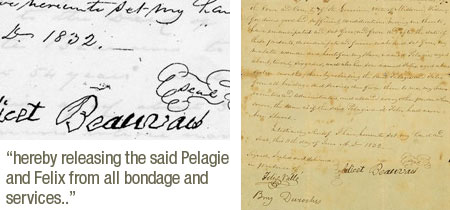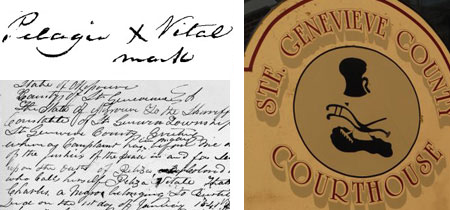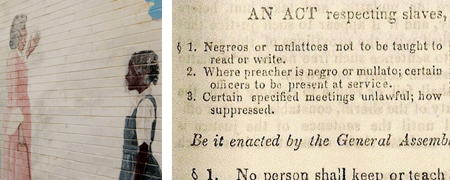-
Birth & Baptism —1805
In 1805 Pelagie is born in Ste. Genevieve, Missouri. Her mother is a black slave. Like all children in town, Pelagie is baptized in the local Catholic church. Her father may well have been Joseph Vital Beauvais, a prominent white citizen who is Pelagie's owner. He is at her baptism, but recognizes Pelagie as his slave not his daughter. After the baptism, Pelagie begins living in the negro quarters in the farmyard behind his house.
View Additional Images
Baptismal Record Baptismal Record Detail
-
Putting a Price on Pelagie — 1817
Pelagie's owner, Vital Beauvais, dies at age 77. She receives nothing from him in his will. Instead, Pelagie is valued as property worth $200 and given to Beauvais' widow Félicité. Mrs. Beauvais is described as a large lady who is rigid and severe with her "colored domestics" and treats friends and family with kindness. Pelagie serves her African gumbo for dinner and carries on.
View Additional Images
Book Page 1 Book Page 2 Vital Beauvais Estate Inventory
-
Falling in Love — 1830
In 1830 Pelagie meets and falls in love with Benjamin Amoureux, a white man. Soon after, in the dead of night, they row across the river in a small boat to Illinois and find a priest to marry them, according to descendant Leola Amoureux Duckett. Upon returning to Ste. Genevieve's Catholic Church, writes Duckett, Pelagie and Benjamin show a priest their marriage certificate and he encourages them to take communion together in front of "stunned parishioners."
The Amoureux Family
-
Becoming a Free Woman — 1832
On June 11 1832, Mrs. Beauvais signs papers freeing Pelagie and her 16-month-old son, Felix, from slavery. They are emancipated. But to remain free Pelagie must apply for her license as a free mulatto at the nearby courthouse. A court officer describes her in the 1836 record books as 33 years old, 5'4" and having a "defective nose." She doesn't let all this slow her down because she's always been free inside.
Registry of Free Negroes & Mulattos Pelagie's Emancipation Document
-
Her Days in Court — 1840, 1841, & 1848
On three separate occasions between 1840 and 1848, Pelagie goes to court. She files complaints against men who mistreat her. She tells the court one "beat her in her own dwelling." Another "threw rocks at her house." Still another was using violent language threatening he would beat her. As a free woman of color, Pelagie knows her rights. She doesn't sit on the sidelines. She takes action.
Download Court Documents
Doc 1 -Transcript Doc 2 -Transcript Doc 3 -Transcript
-
Family Life — 1850
In 1850, the Federal Census lists Pelagie as head of the household that includes her five children: Joseph, Amable, Mary, Francis, and Felix. The census describes them as "mulatto." All the children bear the name of their white father Benjamin Amoureux. None of her school-aged kids attend school. They can't. An 1847 law makes teaching reading and writing to any negro or mulatto in Missouri a crime. The census notes that Pelagie can't read or write. That doesn't stop her from educating her children. Through example she teaches them to believe in themselves. Amoureux House is more than their home. It's also their school for learning life's lessons.
Download 1850 Federal Census 1847 Missouri Legislation 1 1847 Missouri Legislation 2
-
Living as Man & Wife — 1852
On September 12, 1852 Benjamin and Pelagie purchase their house for $700. (The house was built by Pelagie's former slaveholder's brother, Jean Baptiste St. Gemme Beauvais.) In 1860 the Federal Census finally recognizes them as husband and wife. Despite this recognition, Pelagie and their son Felix must once again prove in court that they are no longer slaves. The Civil War is lurking around the corner. These are times of turmoil for everyone.
Download PDFs
1860 Federal Census 1860 Manumission Document
-
Not Forgotten — 1890
On November 11, 1890, Pelagie dies of heart failure in her home. She is 85. The Catholic priest doesn't make it to her bedside in time to administer last rites. She is buried in nearby Valle Spring Cemetery. Her obituary in the Ste. Genevieve Herald notes: "The deceased left behind five children of whom two, Felix and Joseph Amoureux, are well known citizens of Ste. Genevieve." Her grandchildren attend the Lincoln School in town. Amoureux House still stands in Ste. Genevieve, where Pelagie lived a long and productive life. Even though Pelagie left this world more than a century ago, today her descendants continue to tell her story.
Pelagie Amoureux's Obituary
Timeline
